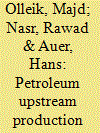| Srl | Item |
| 1 |
ID:
107636


|
|
|
|
|
| Publication |
2011.
|
| Summary/Abstract |
Public support for electricity generation from renewable energy sources is commonly funded by non-voluntary transfers from electricity consumers to producers. Apparently, the cost-effective disposition of funds in terms of induced capacity deployment has to be regarded a key criterion for the success of renewable energy policy.
Grid connection costs are a major cost component in the utilization of offshore wind energy for electricity generation. In this paper, the effect of different attribution mechanisms of these costs on overall cost-effectiveness from consumers' perspective is analyzed.
The major result of this investigation is that an attribution of grid connection costs to grid operators - as against to generators - leads to a smaller producer surplus and, hence, to lower transfer costs for electricity consumers. Applying this approach to the deployment of UK Rounds II and III offshore wind farms could lead to annual savings of social transfers of £1.2b and an equal reduction of producer surplus. This amount would be sufficient to finance the deployment of additional 10% of the capacity under consideration.
|
|
|
|
|
|
|
|
|
|
|
|
|
|
|
|
| 2 |
ID:
180090


|
|
|
|
|
| Summary/Abstract |
Developing countries endowed with petroleum resources face various challenges in balancing their economic development needs and their contribution to combating climate change. They aim at increasing their reliance on renewable energy; however, they are faced with regulatory, financial, technical, and knowledge-related barriers. Many oil and gas companies started to transition from their core business in oil and gas to the wider energy field. In this paper, we show how the most common contractual arrangement between developing countries and oil and gas companies - the Production Sharing Contract (PSC) - can be modified to include renewable energy elements. We introduce a Renewable Contribution parameter that defines the share of the company profit petroleum that should be re-invested in renewable energy in the host country and we develop an optimization model that defines the state objective function and constraints. We apply the modified PSC to the case of Lebanon after populating various oil and gas and renewable energy scenarios. We show that a limited Renewable Contribution of 10% can provide a large share of the investment needs of the renewable energy sector and can contribute to emission reduction, economic development and job creation while providing companies with attractive economic incentives.
|
|
|
|
|
|
|
|
|
|
|
|
|
|
|
|